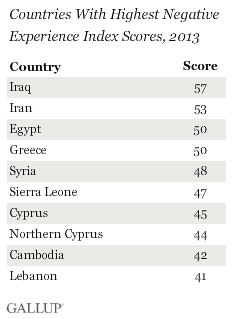On June 3, Gallup rereleased its most recent rankings of positive emotions, with Iran at 93 on a list of 138 countries. Iranians reported the “highest negative emotions in the world, second only to Iraq,” according to the study. Gallup highlighted its findings two weeks after six young Iranians – including three women without hijab – were arrested for appearing in a YouTube video singing along to Pharrell William’s “Happy.” The dancers were released one day later, after an international outcry on social media against their arrest. A tweet on President Hassan Rouhani's semi-official account may have indicated disapproval of the detention: “Happiness is our people's right. We shouldn't be too hard on behaviors caused by joy.”
The latest version of “Happy” from Iran features Pharrell William’s “puppet fans.” The following clip was posted on May 31 by animator and cartoonist Mehdi Alibeygi.
The following are excerpts from Gallup’s report.
Iran's leadership is right to be concerned about the country's happiness. Gallup's most recent rankings of positive emotions find Iran at 93 on a list of 138 countries. Iranians also reported the highest negative emotions in the world, second only to Iraq.
 Gallup measured negative emotions in 138 countries in 2013 by asking people whether they experienced a lot of anger, stress, sadness, physical pain, and worry the previous day. Gallup compiles the "yes" results into a Negative Experience Index score for each country. The higher the score, the more pervasive negative emotions are in a country.
Gallup measured negative emotions in 138 countries in 2013 by asking people whether they experienced a lot of anger, stress, sadness, physical pain, and worry the previous day. Gallup compiles the "yes" results into a Negative Experience Index score for each country. The higher the score, the more pervasive negative emotions are in a country. Iranians have every right to feel negative, given the high unemployment coupled with high inflation in their country that has crippled their ability to provide for their families, along with international sanctions over their nuclear program that have hurt their livelihoods. Additionally, 48% of Iranians in 2013 said they would not recommend their city or area where they live to a friend or associate as a place to live.
Survey Methods
Results are based on telephone and face-to-face interviews with approximately 1,000 adults in each country, aged 15 and older, conducted in 2013 in 138 countries and areas. For results based on the total global sample, the margin of sampling error is less than ±1 percentage point at the 95% confidence level. For results based on country-level samples, the margin of error ranges from a low of ±2.1 to a high of ±5.3. The margin of error reflects the influence of data weighting. In addition to sampling error, question wording and practical difficulties in conducting surveys can introduce error or bias into the findings of public opinion polls.
Click here for the full report.
